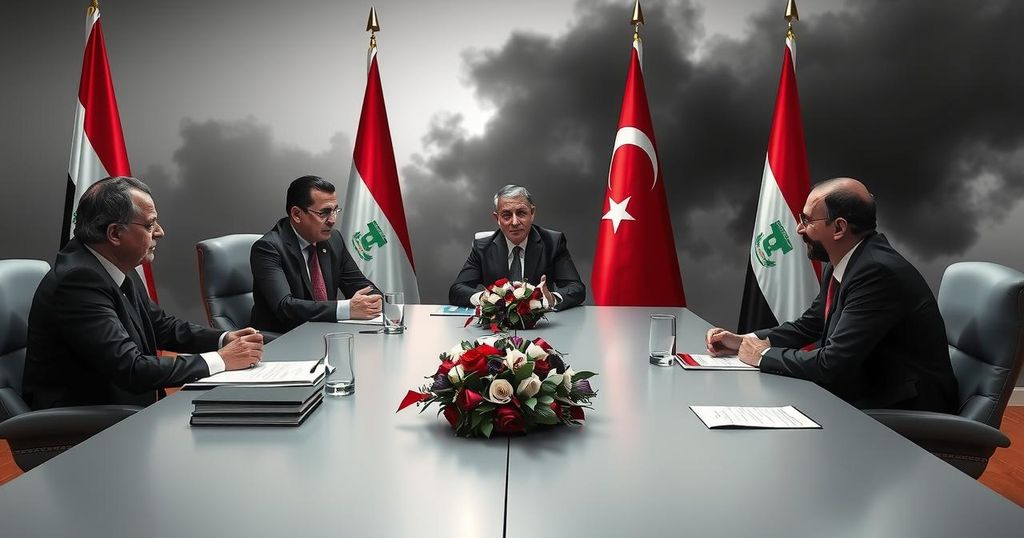Egyptian President Al-Sisi highlights the need for Syrian unity, while Turkish President Erdoğan calls for international cooperation in reconstruction. Syrian opposition leader Bader Jamous emphasizes the necessity of transitional justice and an inclusive political process. International responses include calls for maintaining state institutions and addressing humanitarian needs, along with France’s renewed diplomatic engagement in Syria.
In a recent phone call, Egyptian President Abdel Fattah Al-Sisi underscored the critical need to maintain Syria’s unity and territorial integrity while advocating for a comprehensive political dialogue that incorporates all factions of the Syrian populace. Turkish President Recep Tayyip Erdoğan echoed this sentiment by emphasizing international collaboration in Syria’s reconstruction following the ousting of former President Bashar Al-Assad. During his meeting with Qatari Emir Sheikh Tamim bin Hamad Al Thani, Erdoğan remarked on Turkey’s commitment to combating terrorist organizations, which it identifies as threats to national security.
Bader Jamous, the head of the Syrian Negotiation Commission, articulated the urgent requirement for transitional justice in Syria, stating that pursuing accountability for the previous regime is essential. He referenced UN Security Council Resolution 2254 as a framework for realizing the Syrian people’s aspirations, advocating an inclusive national government and the establishment of a constituent assembly to draft a new constitution. The necessity for fair elections, supervised by the United Nations, was also stressed in his remarks.
In an international context, Russia’s representative, Vasily Nebenzya, remarked on Israeli forces operating in close proximity to Damascus and urged the maintenance of state structures in Syria, advocating for lifting sanctions. UN Special Envoy Geir Pedersen highlighted the need for a cohesive political transition for economic support, while Tom Fletcher, the UN Under-Secretary-General, reported alarming humanitarian conditions affecting over 70% of the Syrian population, necessitating urgent assistance.
The French Ministry of Foreign Affairs has re-engaged with Syrian transitional authorities by sending a diplomatic mission to relay messages concerning an inclusive political transition. France raised its flag at its embassy in Damascus after a 12-year closure, although it clarified this act does not symbolize an official reopening. France intends to focus on collective security threats, particularly against ISIS and other extremist groups, advocating for a credible political transition in line with UN stipulations.
The ongoing conflict in Syria has led to a complex political landscape with various national and international actors asserting influence over the country’s future. The Syrian civil war, which erupted in 2011, has involved numerous factions and has drawn in countries such as Turkey, Russia, and the United States. Calls for unity and transitional justice reflect the contention surrounding the legacy of the Assad regime and ongoing instability in the region. The involvement of international organizations such as the United Nations and the French government’s renewed interest in diplomatic engagement are indicative of the global community’s response to the situation. Furthermore, the humanitarian crisis exacerbated by the conflict remains critical, with millions in need of aid and countries like Turkey, Lebanon, and Jordan offering assistance amid concerns over security and stability in the region.
This article underscores the multifaceted approach required to address the Syrian crisis, emphasizing national unity, transitional justice, and the role of the international community. It illustrates the balance of power dynamics, the pressing need for humanitarian aid, and the establishment of a political framework that embodies inclusivity. The varied responses from regional powers such as Egypt and Turkey, along with the re-engagement of France, depict a critical juncture in Syria’s ongoing struggle for stability and reconstruction.
Original Source: www.dailynewsegypt.com






